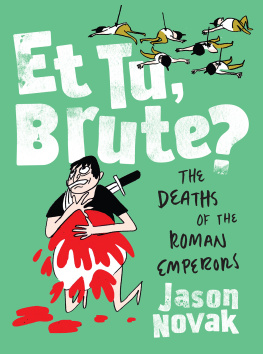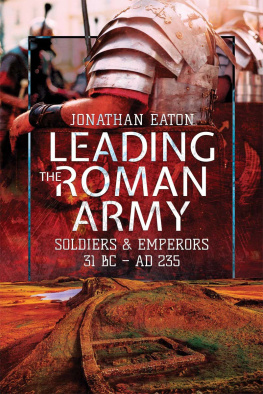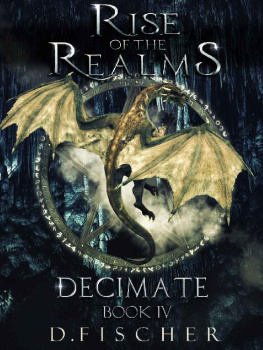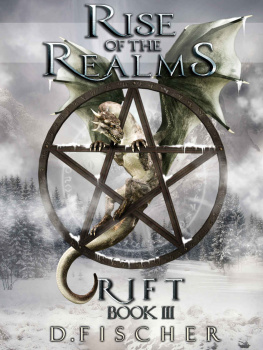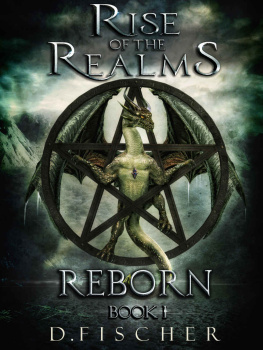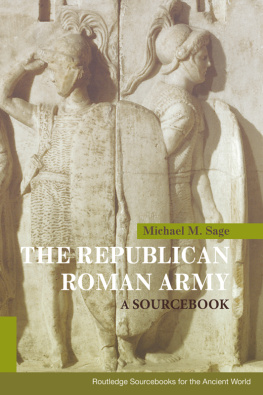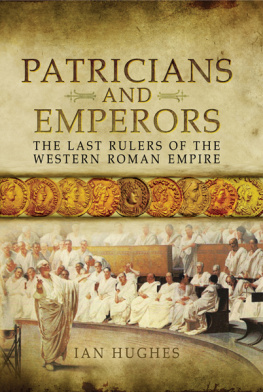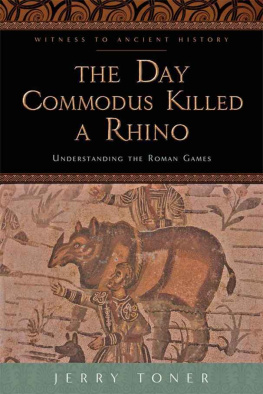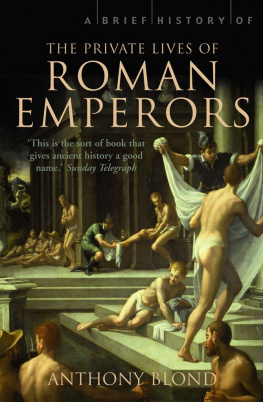Thomas Fischer - Army of the Roman Emperors
Here you can read online Thomas Fischer - Army of the Roman Emperors full text of the book (entire story) in english for free. Download pdf and epub, get meaning, cover and reviews about this ebook. year: 2019, publisher: Casemate Publishers (Ignition), genre: Religion. Description of the work, (preface) as well as reviews are available. Best literature library LitArk.com created for fans of good reading and offers a wide selection of genres:
Romance novel
Science fiction
Adventure
Detective
Science
History
Home and family
Prose
Art
Politics
Computer
Non-fiction
Religion
Business
Children
Humor
Choose a favorite category and find really read worthwhile books. Enjoy immersion in the world of imagination, feel the emotions of the characters or learn something new for yourself, make an fascinating discovery.
- Book:Army of the Roman Emperors
- Author:
- Publisher:Casemate Publishers (Ignition)
- Genre:
- Year:2019
- Rating:5 / 5
- Favourites:Add to favourites
- Your mark:
- 100
- 1
- 2
- 3
- 4
- 5
Army of the Roman Emperors: summary, description and annotation
We offer to read an annotation, description, summary or preface (depends on what the author of the book "Army of the Roman Emperors" wrote himself). If you haven't found the necessary information about the book — write in the comments, we will try to find it.
Army of the Roman Emperors — read online for free the complete book (whole text) full work
Below is the text of the book, divided by pages. System saving the place of the last page read, allows you to conveniently read the book "Army of the Roman Emperors" online for free, without having to search again every time where you left off. Put a bookmark, and you can go to the page where you finished reading at any time.
Font size:
Interval:
Bookmark:

THOMAS FISCHER

 OF THE
OF THE 

With contributions by
Ronald Bockius, Dietrich Boschung, and Thomas Schmidts
Translated by
M. C. Bishop

Published in the United States in 2019 by
CASEMATE PUBLISHERS
1950 Lawrence Road, Havertown, PA 19083
and in the United Kingdom by
OXBOW BOOKS
The Old Music Hall, 106108 Cowley Road, Oxford, OX4 1JE
Hardcover Edition: ISBN 978-1-61200-810-3
Digital Edition: ISBN 978-1-61200-811-0 (epub
eISBN 978-1-78925-185-2
Mobi ISBN 978-1-78925-186-9
First published as Die Armee der Caesaren: Archologie und Geschichte in 2012 (revised 2014) by Verlag Friedrich Pustet, Regensburg, Germany
Text 2012, 2014 Thomas Fischer, Ronald Bockius, Dietrich Boschung and Thomas Schmidts
Translation 2017 M. C. Bishop
English Language Edition Oxbow Books 2019
All rights reserved. No part of this book may be reproduced or transmitted in any form or by any means, electronic or mechanical including photocopying, recording or by any information storage and retrieval system, without permission from the publisher in writing.
For a complete list of Casemate titles, please contact:
CASEMATE PUBLISHERS (US)
Telephone (610) 853-9131
Fax (610) 853-9146
Email:
www.casematepublishers.com
CASEMATE PUBLISHERS (UK)
Telephone (01865) 241249
Telephone (610) 853-9131, Fax (610) 853-9146
Email:
www.casematepublishers.co.uk
Front cover: (Background) Rome, Trajans Column. (Foreground) Reconstructed Hebron type helmet (iron and copper alloy). Photo: J. Pogorzelski
I still remember my excitement when, as a teenager, I was given a copy of the first edition of Graham Websters Roman Imperial Army. It served as my introduction to the serious study of the Roman army and was a much-loved companion through my undergraduate and postgraduate years even if, as was inevitable, it became increasingly more dated as ideas and discoveries moved on and, in a few details, completely and utterly wrong: such is the fate of any textbook. That does not diminish from its intrinsic value, but it does mean that I have spent many years casually looking at the many books produced on the Roman army for one I could recommend to my younger self (or, for that matter, anybody else) and say with confidence this is the one for you now.
It took many years, but when in 2012 my friend Prof. Tom Fischer sent me a copy of his new book, Die Armee der Caesaren , I knew this was it. The only problem was that it was in German, which meant somebody would have to translate it into English for a non-German-reading public. Paradoxically, it is well nigh impossible to study the Roman army in any depth without reading German, simply because so many excellent scholars of that institution have come from German-speaking countries. Indeed, the interplay of British (and latterly American) and German, Austrian, and Swiss scholarship on the Roman army has been pivotal since the 19th century.
The challenges for a translator of such a work are many, although the technical vocabulary is strangely not one of them. The first thing an English-speaking exercitologist needs to know is how to distinguish a Schuppenpanzer (scale armour) from a Schienenpanzer (articulated plate armour), or a Rasenodermauer (turf rampart) from a Holz-Erde-Mauer (earth-and-timber rampart although most anglophone scholars tend to just use Holz-Erde-Mauer !). Coping with the German avoidance of the passive voice, or leaving verbs to come panting apologetically home at the end of a sentence after some clausal gymnastics, albeit imperfectly, comes later. A literal translation is not necessarily a readable one, however, and here the translator must walk a tightrope between faithfully rendering the German text into English, while maintaining sense and flow.
This is one reason why the translator (certainly this one) needs help. All the dictionaries in the world (paper or online) cannot match having the assistance of a competent native German speaker on hand to check every word. If they also happen to be exceedingly good at English (at times better than the translator!) and also a specialist on the Roman army, then so much the better. I am fortunate in having been able to turn to Dr Stefanie Hoss, who has relentlessly sorted out some of my messier passages, bad (or wrong) translations, and general infelicitudes with aplomb and finesse, before I ran the resulting text past Tom for his approval. My gratitude to both of them is boundless.
Having recognized that this book needed to be translated into English, I was indeed fortunate in being able to persuade Clare Litt at Oxbow Books (now part of Casemate Publishers) of the merits of the project. I must thank her for her patience as I ploughed on through several deadlines, barely aware of the famed whooshing sound that Douglas Adams noted define their passing.
This then, born Die Armee der Caesaren , is now Army of the Roman Emperors . I have learned much by translating it; I hope you do by reading it. If it inspires you to study the Roman army in greater depth, then so much the better.
M. C. Bishop
Pewsey, March 2017
Many have cooperated on a book like this, which has been in development for decades. There remains the particular necessity, and pleasant task, of expressing gratitude to employees, colleagues, experimental archaeologists and various collectors for technical assistance, information, and constructive criticism, without which the book could not have come about in this form. In particular the following should be mentioned here:
Michael Berger (Munich), Dr Marion Brggler (Xanten), Dr Alexandra W. Busch (Rome), Prof. Dr Karlheinz Dietz (Wrzburg), Michael Drechsler (Cologne), Manfred Eberlein (Munich), Prof. Dr Werner Eck (Cologne), Veronika Fischer MA (Munich), Holger von Grawert (London), Prof. Dr Nicolae Gudea (Cluj-Napoca), Dr Norbert Hanel (Cologne), Jens Horstkotte (Munich), Dr Stefanie Hoss (Nijmegen), Dr Marcus Junkelmann (Oberempfendorf ), Christian Levett (Mougins, Museum of Classical Art), Prof. Dr Michael Mackensen (Munich), Ingo Martell MA (Xanten), Susana Matesic MA (Schleswig), Dr Semra Mgele (Cologne), Dr Mark Merrony (Mougins, Museum of Classical Art), Dr Christian Miks (Mainz), Prof. Dr Gnter Moosbauer (Osnabrck), Dr Martin Mller (Xanten), Dr Ansgar Nabbefeld (Cologne), PD Dr Salvatore Ortisi (Cologne), Dr Anette Paetz ne Schieck (Mannheim), Dr Andreas Pangerl (Munich), Dr Richard Petrovszky (Speyer), Dr Matthias Pfaffenbichler (Vienna), Dr Barbara Pferdehirt (Mainz), Jrg Pogorzelski (Cologne), Dr Johannes Prammer (Straubing), Dr Hans Hojer von Prittwitz und Gaffron (Bonn), Prof. Dr Michel Redd (Paris), Dr Alexander Reis (Bonn), Dr Marcus Reuter (Xanten), Dr Erika Riedmeier-Fischer (Weilerswist), Dr Wolfgang Risse (Langquaid), Dr Hajo Schalles (Xanten), Prof. Dr Egon Schallmayer (Wiesbaden), Dr Bernd Steidl (Munich), Benjamin Streubl MA (Mayen), Alois Wenninger (Munich), and Martin Wieland MA (Cologne).
Font size:
Interval:
Bookmark:
Similar books «Army of the Roman Emperors»
Look at similar books to Army of the Roman Emperors. We have selected literature similar in name and meaning in the hope of providing readers with more options to find new, interesting, not yet read works.
Discussion, reviews of the book Army of the Roman Emperors and just readers' own opinions. Leave your comments, write what you think about the work, its meaning or the main characters. Specify what exactly you liked and what you didn't like, and why you think so.




